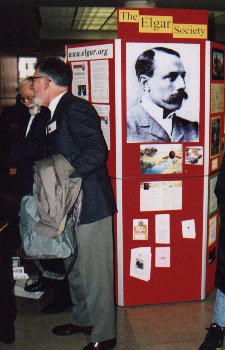|
Edward Elgar:
The sketches for Symphony No 3 elaborated by Anthony Payne
First public performance: 15 February, 1998; Royal Festival Hall, London
BBC Symphony Orchestra conducted by Andrew Davis
The BBC have obviously made the most of this occasion, as the original commission was
theirs, and it was certainly apt that the BBC Symphony Orchestra has performed and recorded
it. In the February edition of the BBC Music Magazine, the producer Colin Matthews made the
case for the venture and Anthony Payne described his involvement with the sketches and how they
were brought to fruition. Matthews points out that "although it was obviously not his intention,
Reed's publication of the sketches made reconstruction by someone inevitable, since it meant that
the work would eventually come into the public domain", and thus commends as "realistic" the
decision of the Elgar family to sanction the new version. "But", he continues, "the critical point
is whether the work had reached a stage at which its reconstruction is more than mere guesswork,
and, equally important, whether the quality of the surviving material makes it worthwhile...What
is lacking is not so much development (much of which is implicit) as the overall pulling together
of the material - a consequence of Elgar's usual practice of only finalising the work when putting
it into full score. He had begun to do this not long before his last illness struck, so that, in his
mind, the symphony was probably more or less complete...(The music's) remarkable quality
remains intact even though someone has had to stand in for the composer in bringing the work
to its final form. Although there cannot be any pretence that this is the symphony as Elgar would
have completed it, what we are given is the unmissable opportunity to hear the final thoughts of
a great composer...For better or worse, Elgar's sketches have been preserved. As a result of his
long involvement with them, with a composer's unique insight, and with a deep love and
understanding of Elgar's music, Anthony Payne has rescued them from silence, and for that the
only proper response is one of immense gratitude".
Anthony Payne writes that when he first saw the sketches, "...I immediately heard orchestral
sounds in my head...They showed the composer inspired, giving the lie to received opinion that
he had become a spent force after his wife's death". In 1993 he was asked by a BBC producer to
"put them into some sort of shape for workshop performance". Feeling inspired and exhilarated,
he completed the Scherzo from the sketches, and wrote out a complete exposition of the Adagio.
This movement, Payne noted, was completed on 24 February 1994, the day after the sixtieth
anniversary of Elgar's death. The Elgar family now intervened, and forbade the project to
continue, but had no objection to Payne making a radio broadcast of the sketches in their original
form. This took place in March 1995, and that seemed to be that. However, shortly after, Payne
discovered that some snippets he had formerly discounted were the key to completing the first
movement, which he did. "I felt for the first time that I. could perhaps complete the whole
symphony. It seemed as if I was being impelled by forces outside myself". Now the family,
realising that copyright on the sketches would expire in 2005, decided to commission from Payne
a complete version. "I began to write out in full score all that I had so far done. In the process,
I became aware of its overall sweep, different in its sheer breadth of emotion from any of his other
symphonic works. There was the raw vigour and magic lyricism of the opening movement, a
lighter manner in the second which went far beyond his established symphony practice, and the
searing intensity of the Adagio, tragic in its import, while the finale revealed a world of chivalric
action and drama".
There was a real sense of occasion. The Royal Festival Hall was packed, and nearly 300
Society members were present, some having come from Scotland, America and even Australia.
I saw at least four Vice-Presidents. The BBC Orchestra and Andrew Davis were also plainly
aware that this was no ordinary concert; the performance had an edge and an energy rather
lacking at the first (private) performance I had attended in October, when the work didn't really
come off. Possibly they were rather jaded on that occasion, having just finished recording it. Or
perhaps it had had time to grow on me. The reception at the end was ecstatic; Anthony Payne was
called forward, and recalled several times. Initial press reaction was similarly enthusiastic; and it's
good to know that it will be performed elsewhere soon - in Scotland, and in the United States,
at Philadelphia. What its long-term place will be, only time will tell; I can only say that I was glad
to have been there, glad to have heard it, and grateful to Mr Payne for giving me the

|
opportunity.
Paul Rooke had erected his display stand (giving details of the Society) on a prime site near
the ground floor bar, and there seemed to be considerable interest. The enjoyment of the evening
was enhanced by meeting old friends, and everyone to whom I spoke thought highly of the end
result. Whatever one's views of the rights and wrongs of the project, we must hope that Elgar's
name and reputation will benefit from its completion; the initial prospect seems promising. As
members will know, the family are anxious that the work should be referred to in an appropriate
way with an approved title. This should be 'Edward Elgar - the Sketches for Symphony no 3
elaborated by Anthony Payne'. Given that this is too long for a working title, an acceptable
shorthand is 'Elgar/Payne Symphony no 3', or even 'Elgar/Payne 3'. The co-operation of Society
members is earnestly sought in ensuring that the correct title is used.
|